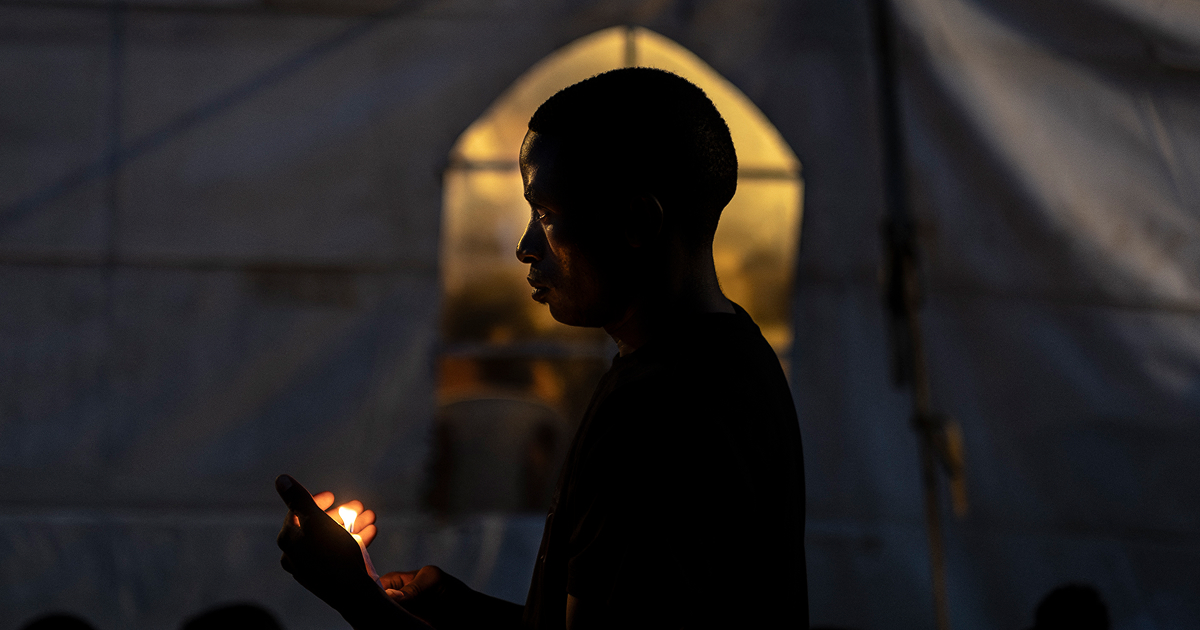A victim of clerical sexual abuse that occurred 57 years ago has created Brazil’s first organisation that represents other victims of such abuse.
The Network of Survivors of Ecclesiastical Abuse is the initiative of Valdea Caratchuk, a resident in Brazil’s Paraná state. She “rediscovered” what happened to her only 11 years ago, during therapy, after decades hiding it under layers of fear and shame.
The South American country has had at least 148 reported cases of children and teenagers being abused by members of the clergy since 2000, according to a recent study, but reportedly the numbers could be much higher.
“I went back to the memories of my childhood and could perfectly see what the priest did to me 57 years ago at the parish,” Valdea Caratchuk told Crux.
Her mother, a widow, made a living as a seamstress for the parish. Caratchuk, who was the youngest of four siblings, would take the garments to the church, as her mother had undergone leg surgery.
“He would take me in his arms," she recalled. "That’s how it happened."
Caratchuk isn’t sure how many times she was abused. She knows the priest remained in her city for only two years and thinks other girls might have been abused too. But she can’t accuse the priest of anything now, because he died four years ago and a law forbids people to defame the memory of the deceased.
“The statute of limitations expired long ago. So, I have my hands tied when it comes to my own aggressor,” Caratchuk says.
Her mother, who died years ago, never knew what happened to her. She only told one of her sisters, who coincidentally had her marriage celebrated by that same priest.
For decades, the crime of her abuse haunted her. She developed a repugnance for priests and ended up leaving the Church, becoming a Spiritist, a follower of the doctrine of French-born writer Allan Kardec, which has a large number of adherents in Brazil.
Caratchuk realised that healing depended on her talking about the crime, as she has now done so on various occasions, at times to relatively large audiences, during events focused on coaching and mentoring.
At the end of last year, she watched the US-Canadian documentary Sugarcane, about Canada's Church-run Indian residential school system that has faced allegations of abuse and other human rights violations.
“I was very impacted by the movie and decided it was about time to establish a group in Brazil for abuse survivors,” Caratchuk explained. (Some of the allegations about Canada's Indian residential school system have been strongly refuted and in 2025 the Canadian government halted an inquiry into claims of mass burials of children at former Church-run residential schools – after not one grave was discovered.)
Caratchuk looked online for help and discovered the book Pedofilia na Igreja (“Paedophilia in the Church”), published by journalists Fabio Gusmão and Giampaolo Morgado Braga in 2023.
It was the first study of child abuse in the Church in Brazil, and the book detailed that at least 148 children and teenagers were abused by 108 clergy members since 2000. The authors, however, claim that the numbers could be much higher, given that there has been a long tradition of covering up cases in the country.
“When we were writing the book, we noticed the victims didn’t have any kind of support. Everybody focused on punishing the perpetrators, something of fundamental importance, but the victims were totally forsaken,” writer Braga told Crux.
After denouncing the abuse they suffered, most of the victims would lose their community – which in many cases sided with the aggressor – and even their families at times, which could also have the effect of casting doubt about the original crime.
“They would be impeded to rely on their own faith, which had been impacted by the abuser as well,” Braga said.
He and Gusmão accompanied the work of groups of abuse survivors in the US and European countries, and therefore knew how important such groups were for the victims. When Caratchuk called Braga, he advised her to launch a similar initiative like.
She soon discovered online an Argentine survivors’ network and got in touch with them. Since then, the group has been helping her to structure the Brazilian chapter of the network. Caratchuk has been taking part in their weekly encounters.
“I was surprised when I realised that all South American countries already had a network of Church abuse survivors, except for Brazil,” she said.
Her group is now formed with an activist, who works for the protection of children, and a lawyer. Caratchuk hopes that the network will soon grow, despite the difficulties posed by the Brazilian situation.
“The media in Brazil is afraid to talk about clerical abuse, because it fears legal action from Church groups. But we have to go on,” she said.
In Braga’s opinion, the creation of a network of victims is fundamental.
“Those people need to receive support. They need psychological and legal advice. They need to see other victims and understand they’re not alone,” he said.
Caratchuk said she hopes she can help some of those people.
“I’ve been training as a therapist in order to work with the victims,” she said.
Photo: Aerial view of the statue of Christ the Redeemer after being plunged into darkness for the Earth Hour environmental campaign on top of Corcovado hill in Rio de Janeiro, Brazil, 22 March 2025. (Photo by MAURO PIMENTEL/AFP via Getty Images.)
A victim of clerical sexual abuse that occurred 57 years ago has created Brazil’s first organisation that represents other victims of such abuse.
The Network of Survivors of Ecclesiastical Abuse is the initiative of Valdea Caratchuk, a resident in Brazil’s Paraná state. She “rediscovered” what happened to her only 11 years ago, during therapy, after decades hiding it under layers of fear and shame.
The South American country has had at least 148 reported cases of children and teenagers being abused by members of the clergy since 2000, according to a recent study, but reportedly the numbers could be much higher.
“I went back to the memories of my childhood and could perfectly see what the priest did to me 57 years ago at the parish,” Valdea Caratchuk told <em>Crux</em>.
Her mother, a widow, made a living as a seamstress for the parish. Caratchuk, who was the youngest of four siblings, would take the garments to the church, as her mother had undergone leg surgery.
“He would take me in his arms," she recalled. "That’s how it happened."
Caratchuk isn’t sure how many times she was abused. She knows the priest remained in her city for only two years and thinks other girls might have been abused too. But she can’t accuse the priest of anything now, because he died four years ago and a law forbids people to defame the memory of the deceased.
“The statute of limitations expired long ago. So, I have my hands tied when it comes to my own aggressor,” Caratchuk says.
Her mother, who died years ago, never knew what happened to her. She only told one of her sisters, who coincidentally had her marriage celebrated by that same priest.
For decades, the crime of her abuse haunted her. She developed a repugnance for priests and ended up leaving the Church, becoming a Spiritist, a follower of the doctrine of French-born writer Allan Kardec, which has a large number of adherents in Brazil.
Caratchuk realised that healing depended on her talking about the crime, as she has now done so on various occasions, at times to relatively large audiences, during events focused on coaching and mentoring.
At the end of last year, she watched the US-Canadian documentary <em>Sugarcane</em>, about Canada's Church-run Indian residential school system that has faced allegations of abuse and other human rights violations.
“I was very impacted by the movie and decided it was about time to establish a group in Brazil for abuse survivors,” Caratchuk explained. (Some of the allegations about Canada's Indian residential school system have been strongly refuted and in 2025 the <a href="https://thecatholicherald.com/failure-to-find-bodies-ends-canadas-inquiry-in-mass-burials-at-church-run-schools/"><mark style="background-color:rgba(0, 0, 0, 0)" class="has-inline-color has-vivid-cyan-blue-color">Canadian government halted an inquiry</mark></a> into claims of mass burials of children at former Church-run residential schools – after not one grave was discovered.)
Caratchuk looked online for help and discovered the book <em>Pedofilia na Igreja </em>(“Paedophilia in the Church”), published by journalists Fabio Gusmão and Giampaolo Morgado Braga in 2023.
It was the first study of child abuse in the Church in Brazil, and the book detailed that at least 148 children and teenagers were abused by 108 clergy members since 2000. The authors, however, claim that the numbers could be much higher, given that there has been a long tradition of covering up cases in the country.
“When we were writing the book, we noticed the victims didn’t have any kind of support. Everybody focused on punishing the perpetrators, something of fundamental importance, but the victims were totally forsaken,” writer Braga told <em>Crux</em>.
After denouncing the abuse they suffered, most of the victims would lose their community – which in many cases sided with the aggressor – and even their families at times, which could also have the effect of casting doubt about the original crime.
“They would be impeded to rely on their own faith, which had been impacted by the abuser as well,” Braga said.
He and Gusmão accompanied the work of groups of abuse survivors in the US and European countries, and therefore knew how important such groups were for the victims. When Caratchuk called Braga, he advised her to launch a similar initiative like.
She soon discovered online an Argentine survivors’ network and got in touch with them. Since then, the group has been helping her to structure the Brazilian chapter of the network. Caratchuk has been taking part in their weekly encounters.
“I was surprised when I realised that all South American countries already had a network of Church abuse survivors, except for Brazil,” she said.
Her group is now formed with an activist, who works for the protection of children, and a lawyer. Caratchuk hopes that the network will soon grow, despite the difficulties posed by the Brazilian situation.
“The media in Brazil is afraid to talk about clerical abuse, because it fears legal action from Church groups. But we have to go on,” she said.
In Braga’s opinion, the creation of a network of victims is fundamental.
“Those people need to receive support. They need psychological and legal advice. They need to see other victims and understand they’re not alone,” he said.
Caratchuk said she hopes she can help some of those people.
“I’ve been training as a therapist in order to work with the victims,” she said.
<em>Photo: Aerial view of the statue of Christ the Redeemer after being plunged into darkness for the Earth Hour environmental campaign on top of Corcovado hill in Rio de Janeiro, Brazil, 22 March 2025. (Photo by MAURO PIMENTEL/AFP via Getty Images.)</em>


















